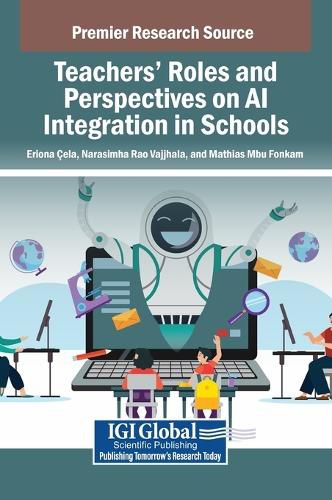Readings Newsletter
Become a Readings Member to make your shopping experience even easier.
Sign in or sign up for free!
You’re not far away from qualifying for FREE standard shipping within Australia
You’ve qualified for FREE standard shipping within Australia
The cart is loading…






This title is printed to order. This book may have been self-published. If so, we cannot guarantee the quality of the content. In the main most books will have gone through the editing process however some may not. We therefore suggest that you be aware of this before ordering this book. If in doubt check either the author or publisher’s details as we are unable to accept any returns unless they are faulty. Please contact us if you have any questions.
The integration of artificial intelligence (AI) in schools is reshaping the role of teachers, causing new opportunities and challenges in the classroom. As AI technologies become integrated into educational tools and curricula, teachers are positioned as academic leaders expected to guide students in navigating the ethical and practical implications of AI. Teachers' perspectives on AI integration vary, with some embracing it as a powerful tool to personalize learning, enhance student engagement, and streamline administrative tasks, while others express concerns about its potential to undermine human connection and equity in education. Understanding teachers' roles in this landscape is essential for ensuring AI is used to complement traditional pedagogies, support diverse learning needs, and foster critical thinking in students. Teachers' Roles and Perspectives on AI Integration in Schools explores the role of academic leaders in the utilization of AI in education. It examines the various tools used by educators to assist students in intelligent technology literacy, and the challenges associated with AI innovations. This book covers topics such as curriculum design, education technology, and academic leadership, and is a useful resource for academicians, educators, computer engineers, scientists, and researchers.
$9.00 standard shipping within Australia
FREE standard shipping within Australia for orders over $100.00
Express & International shipping calculated at checkout
This title is printed to order. This book may have been self-published. If so, we cannot guarantee the quality of the content. In the main most books will have gone through the editing process however some may not. We therefore suggest that you be aware of this before ordering this book. If in doubt check either the author or publisher’s details as we are unable to accept any returns unless they are faulty. Please contact us if you have any questions.
The integration of artificial intelligence (AI) in schools is reshaping the role of teachers, causing new opportunities and challenges in the classroom. As AI technologies become integrated into educational tools and curricula, teachers are positioned as academic leaders expected to guide students in navigating the ethical and practical implications of AI. Teachers' perspectives on AI integration vary, with some embracing it as a powerful tool to personalize learning, enhance student engagement, and streamline administrative tasks, while others express concerns about its potential to undermine human connection and equity in education. Understanding teachers' roles in this landscape is essential for ensuring AI is used to complement traditional pedagogies, support diverse learning needs, and foster critical thinking in students. Teachers' Roles and Perspectives on AI Integration in Schools explores the role of academic leaders in the utilization of AI in education. It examines the various tools used by educators to assist students in intelligent technology literacy, and the challenges associated with AI innovations. This book covers topics such as curriculum design, education technology, and academic leadership, and is a useful resource for academicians, educators, computer engineers, scientists, and researchers.